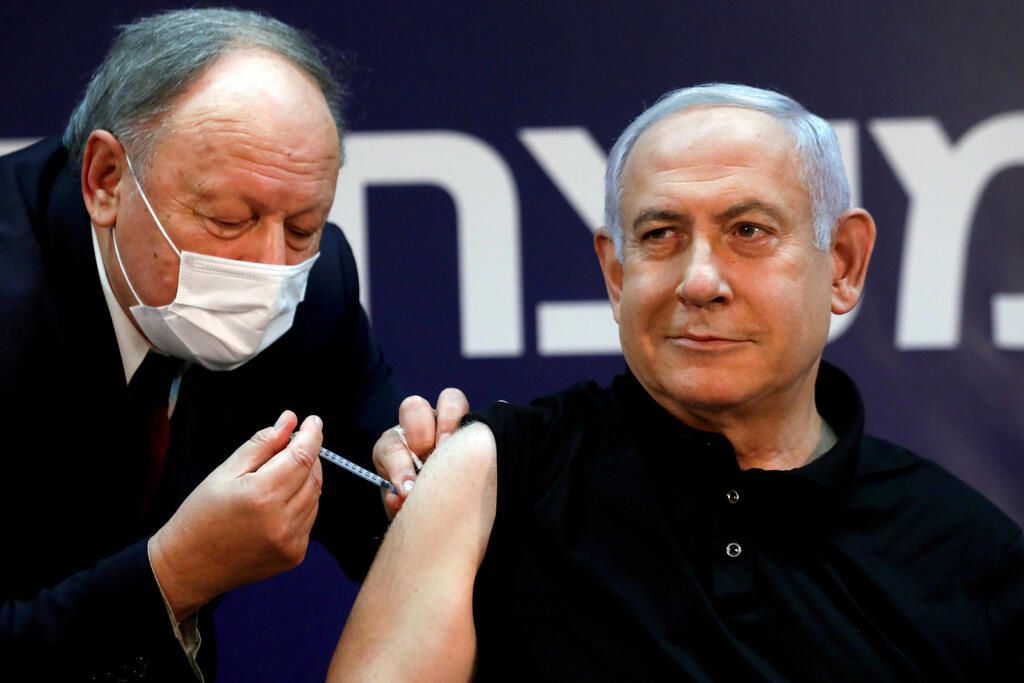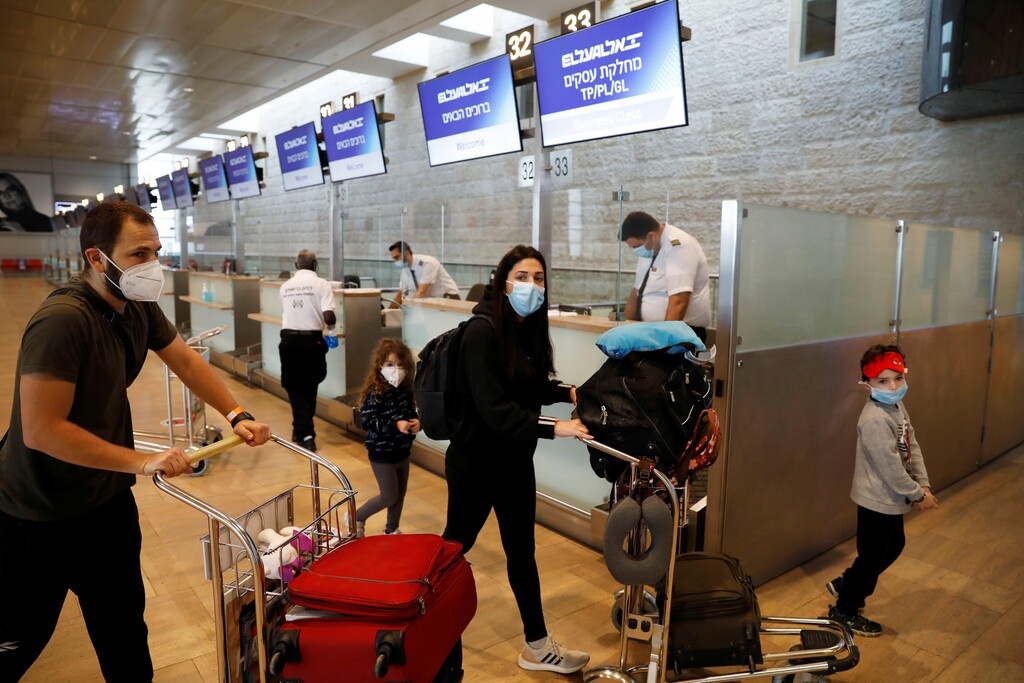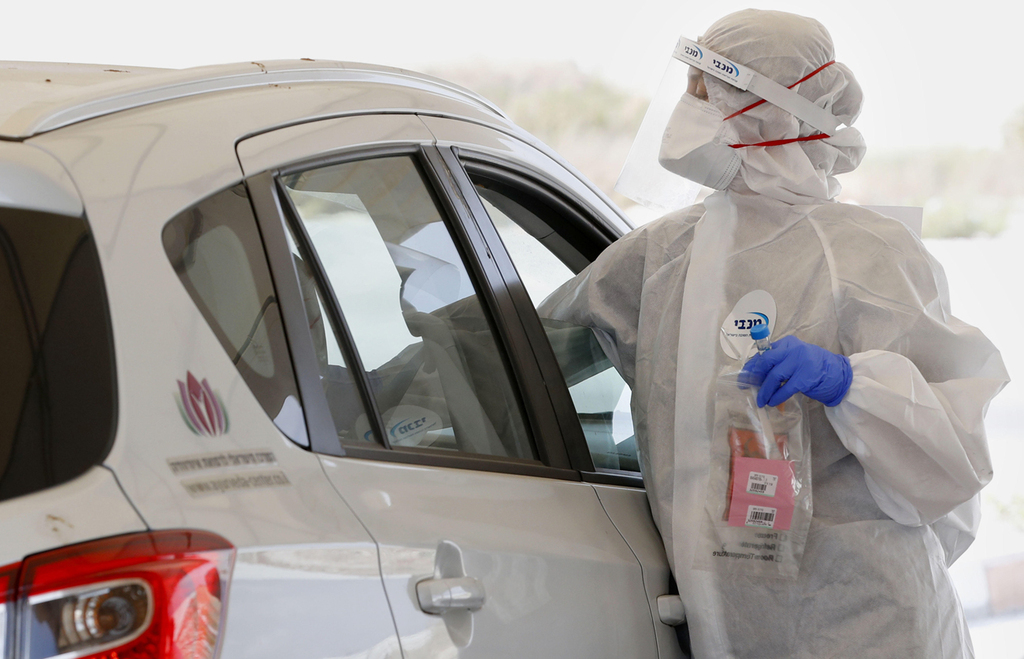Former prime minister Benjamin Netanyahu deserves overall credit for Israel's triumph over the coronavirus pandemic.
After leading Israel's trailblazing vaccination campaign, which flattened the infection curve and essentially wiped out the pathogen within the country, he finishes his tenure on the same week health authorities scrap the last major restriction on Israeli citizens — the indoor mask mandate.
5 View gallery


Then-prime minister Benjamin Netanyahu receives a coronavirus vaccine at Sheba Medical Center in Ramat Gan, December 19, 2020
(Photo: Reuters)
However, up until that victorious moment, Netanyahu had managed the crisis through personal political interests while repeatedly ignoring health officials' advice.
A prime example of this would be his much-belated call to bar flights to and from the United States. While incoming flights from China were banned since January 30, hundreds of flights from the U.S. kept arriving unabated and while cases kept skyrocketing in the U.S., countless travelers entered Israel freely without quarantine.
This all stemmed from Netanyahu's fear such a ban would harm U.S.-Israeli ties.
It took him until March 9 to enjoin all arrivals to self-isolate.
Israel paid a heavy toll for those several weeks of inaction.
5 View gallery


Passengers wearing masks push trolleys at the departures terminal at Ben Gurion Airport
(Photo: Reuters)
A Health Ministry report from mid-April stated that 40% of Israelis who returned from abroad carrying the virus came from the United States.
The report showed that 569 confirmed patients in Israel at the time had contracted the virus in the U.S., four times more than any other nation. This spike in cases mainly affected the ultra-Orthodox community whose COVID-19 infection and death rates significantly exceeded that of any other group.
While Netanyahu should be credited for informing the public on any change in policy, many times his decisions were either made at the last minute or changed on a whim.
The tone and tenor of Netanyahu's public announcements also rollercoastered from one to the other.
The beginning of the crisis was characterized by grimdark predictions, which thankfully did not come to fruition.
In March, Netanyahu said that Israel could see tens of thousands of daily cases within a week, but as the first wave of infections ebbed away by the end of May, he failed to predict the next spike in infections and called on Israelis to go out and "have a good time."
Another example of Netanyahu's shortcomings in handling the pandemic was him outright ignoring ultra-Orthodox educational institutions that remained open while non-Haredi students across the country were forced to go into distant learning.
This unequal treatment stemmed first and foremost from pressure applied on him by his ultra-Orthodox government allies who demanded their communities' schools remain open despite soaring cases.
The fact Netanyahu did not do more to combat this phenomenon led to frequent tackles with health officials, chief among them was the country's first pandemic czar, Prof. Ronni Gamzu.
In addition, the former prime minister's decision to hold a Passover dinner with his son Avner while young people across the country were forced to stay away from their families was particularly egregious, especially since he was supposed to be in quarantine at the time.
Although his management of the pandemic was marred with lapses of judgment and errors, there was one decision Netanyahu had made that flipped everything on its head.
At the end of the day, the one thing that managed to beat the virus quickly was not lockdowns or restrictions, but vaccines.
5 View gallery


A healthcare worker speaks to an Arab Israeli woman before giving her coronavirus vaccine
(Photo: AFP)
Netanyahu, alongside Health Ministry officials, was able to secure agreements with major pharmaceutical companies that were developing the vaccines at a very early stage.
Pfizer's decision to invest all its efforts into Israel was very much the result of Netanyahu's stubbornness, alongside it being a small country with a strong public health system.
Netanyahu deserves full credit for winning the battle against the pathogen, but 6,430 people had to pay for it with their lives — a figure we must not forget when evaluating his handling of the pandemic.



